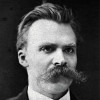“ The genius—in work and in deed,—is necessarily a squanderer: the fact that he spends himself constitutes his greatness. ”
Friedrich Nietzsche, Twilight of the Idols (1889). copy citation
| Author | Friedrich Nietzsche |
|---|---|
| Source | Twilight of the Idols |
| Topic | greatness genius |
| Date | 1889 |
| Language | English |
| Reference | |
| Note | Translated by Anthony M. Ludovici |
| Weblink | https://www.gutenberg.org/files/52263/52263-h/52263-h.htm |
Context
“Buckle, or religiously after the manner of Carlyle.—The danger which great men and great ages represent, is simply extraordinary; every kind of exhaustion and of sterility follows in their wake. The great man is an end; the great age—the Renaissance for instance,—is an end. The genius—in work and in deed,—is necessarily a squanderer: the fact that he spends himself constitutes his greatness. The instinct of self-preservation is as it were suspended in him; the overpowering pressure of out-flowing energy in him forbids any such protection and prudence. People call this "self-sacrifice," they praise his "heroism,"”
source



